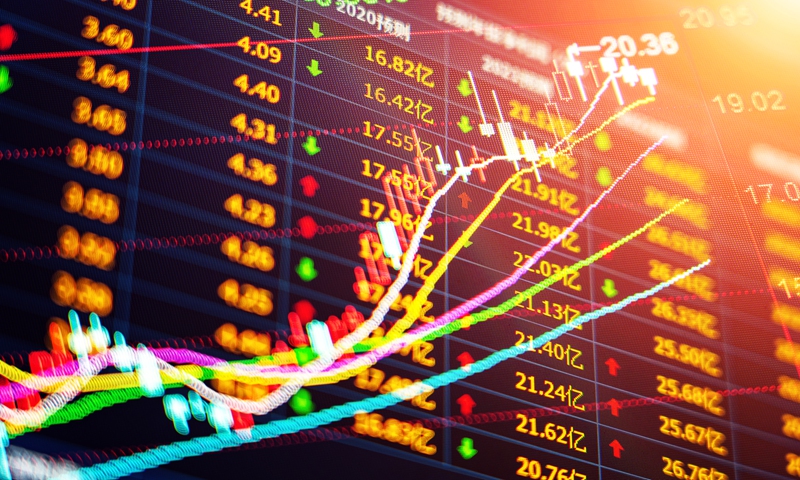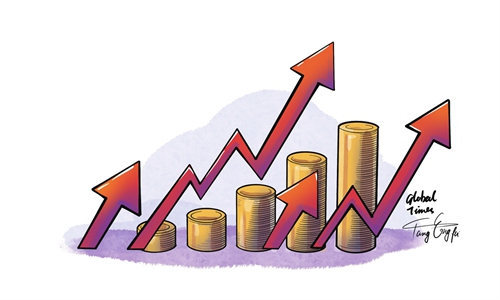Overseas capital flows back to Chinese equities amid US monetary policy tightening
Economic recovery likely to gain pace in coming months: experts

Stock market File photo: VCG
Despite a recent tumult in the US capital market, Chinese stocks last week rebounded strongly, with both markets in Shenzhen and Shanghai recording double-digit gains from the ebb in April. The rebound was also supported by foreign capital's repurchase of Chinese stocks following an earlier sell-off.
The change showed global investors' renewed confidence in China's economic resumption after the government largely brought the latest coronavirus outbreak under control, and they start to view Chinese stocks as an investment safe haven, following the Wall Street rout.
As of Monday, the Shanghai Composite Index had climbed by 14 percent from the lowest point in April, while the Shenzhen market had risen by 19 percent. The ChiNext board of smaller companies in Shenzhen was up about 20 percent.
Market analysts home and abroad read this not as a temporary rise, but a pattern of a long-term valuation rebound of Chinese equities. According to a report of the South China Morning Post on Monday, the recent rebound in China from April's sell-off is "fueling belief that the market is past its worst slump" this year.
Li Daxiao, chief economist at Shenzhen-based Yingda Securities, told the Global Times that mainland stocks should have "passed their worst nosedive" on April 27.
An important driver is renewed inflows of overseas capital. According to a report of Yicai on Sunday, about 41.3 billion yuan ($6.09 billion) of capital had flowed into A shares via the northbound legs of the mainland-Hong Kong stock links in the seven trading days ended on June 10.
This should be a "thorough" turnabout in many overseas investors' strategy, after a large-scale capital withdrawal earlier when a severe wave of coronavirus resurgence started to sweep Shanghai and Beijing, Li said.
From January 27 to March 25, about $13.7 billion flowed out of A-share markets through the stock link programs, the largest scale since early 2020.
According to experts, the comeback of overseas capital reflects renewed confidence in China's economic prospects.
"When the Omicron epidemic first broke out in Shanghai, many overseas investors thought the epidemic would spread all across China. But now they have seen China's control measures are effective, and an economic recovery is a quite certain tendency," Xi Junyang, a professor at the Shanghai University of Finance and Economics, told the Global Times on Monday.
In May, US inflation hit 8.6 percent, the highest in 41 years, which will push the US Federal Reserve to hike rates further. In comparison, China's monetary and fiscal policies are relatively loose, as China's inflation in May is only 2.1 percent.
"The US Fed is focusing on taming inflation and it will resort to monetary policy tightening. This is not a very positive external environment for A shares, but the bright side is, it is making A shares look like better assets to invest in - a safe haven for global capital," Li said.
On Friday, major US stock indices plunged in response to the inflation data. The Dow Jones Industrial Average shed 2.73 percent, while NASDAQ sank 3.52 percent.
Some global strategists are also reportedly turning optimistic on Chinese equities. For example, JPMorgan Asset Management's Global Market Strategist Tilmann Galler said that Chinese equities are beginning to look more attractive despite the headwinds, according to CNBC.
According to Xi, there's still pressure on China's capital markets, as the economy has not fully recovered to pre-pandemic levels. But future corrections should not be as drastic as in March and April, as investors have lowered their expectations and are psychologically prepared for a slow economic recovery. He predicted that the Shanghai index might fluctuate between 3,200-3,500 points in the coming months.
Generally speaking, overseas capital's proportion in Chinese assets is still very low, given China's global economic contributions, Li said, adding it is likely to see more inflows of overseas investment to China in the future.




